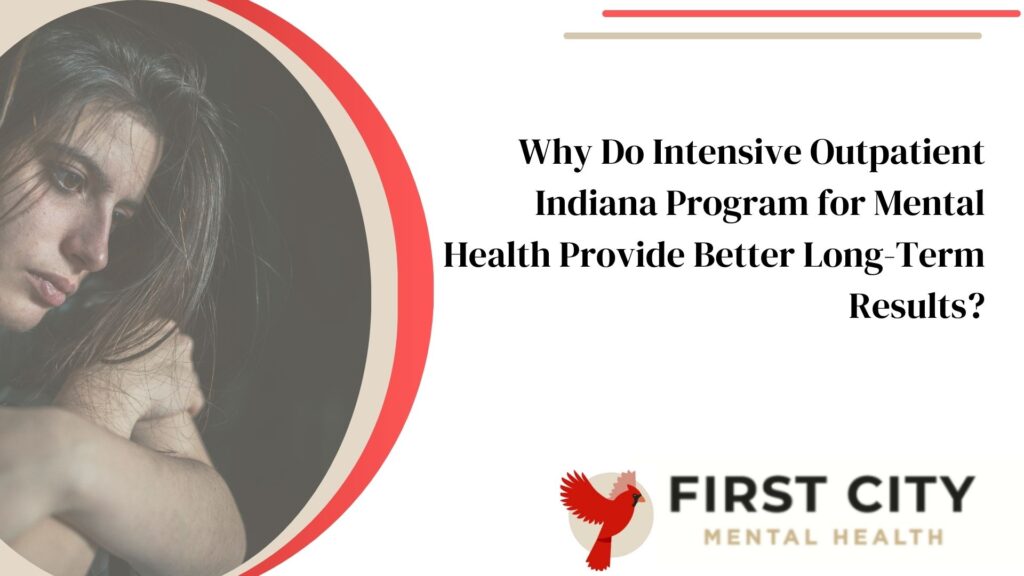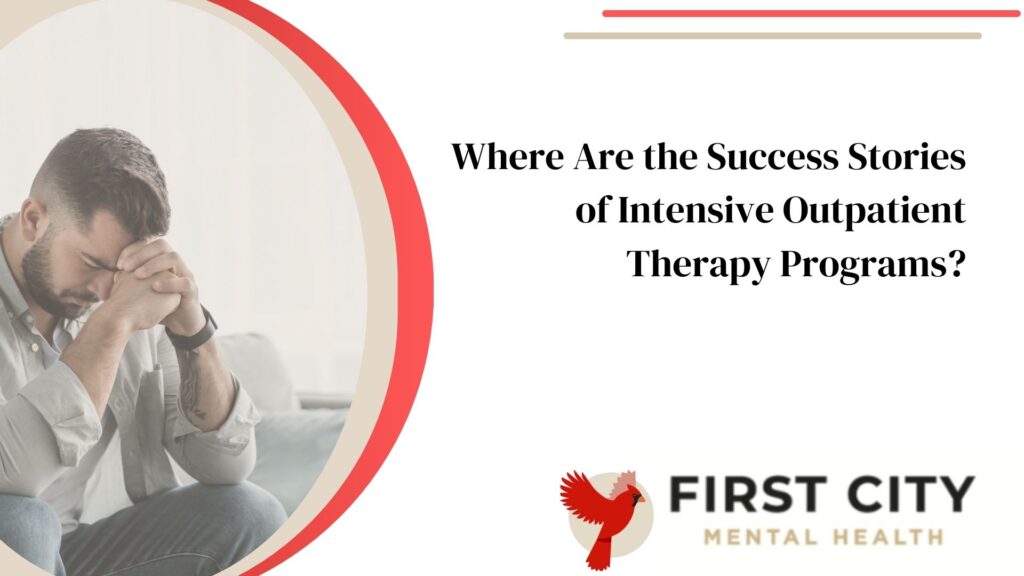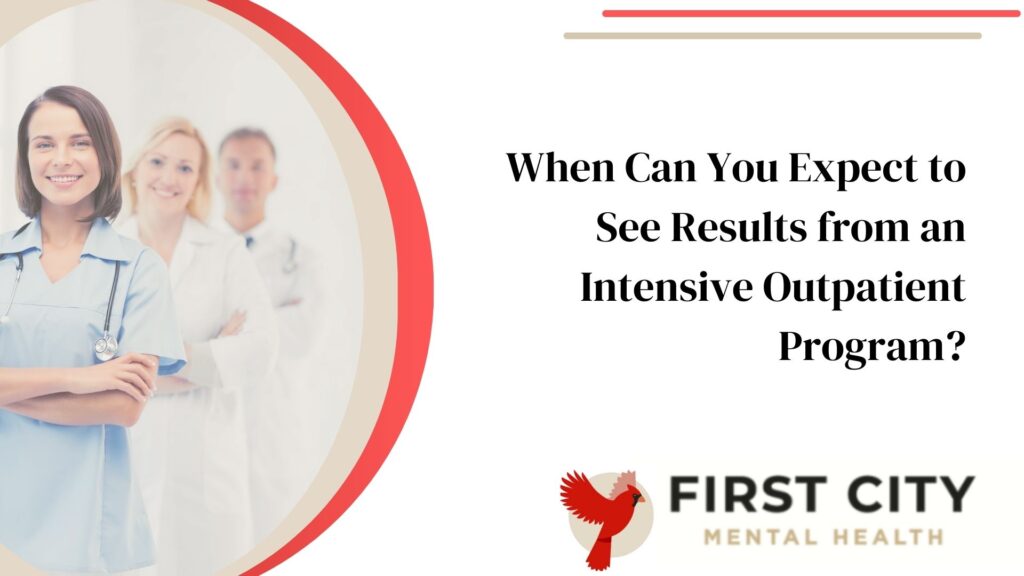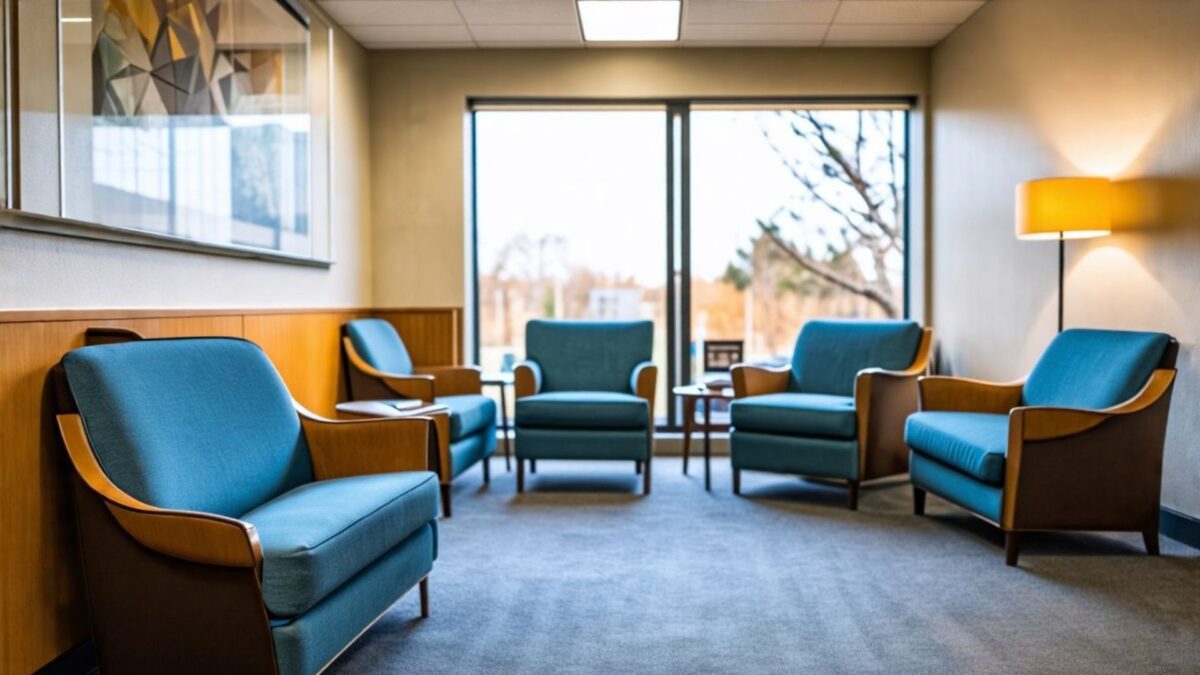
How to Decide if Intensive Outpatient Indiana Treatment Is Right for You?
August 27, 2025
How Long Does a Typical Indianapolis Partial Hospitalization Program Last?
September 1, 2025Are you or a loved one struggling with addiction and wondering about effective treatment options? Many people face the overwhelming challenge of finding a program that provides comprehensive care while allowing them to maintain daily responsibilities.
This is where intensive outpatient Indiana programs come into play.
Intensive Outpatient Programs (I.O.P.s) generally last 4-6 weeks and offer a structured mix of therapies without requiring constant inpatient care. This article will explain why these programs are effective when to opt for them, and how they achieve long-term results.
Keep reading to discover how intensive outpatient Indiana programs can help on your path to recovery!
Key Takeaways
- Intensive Outpatient Programs (IOPs) in Indiana typically last 4-6 weeks and offer structured therapy while allowing patients to maintain their daily responsibilities, providing a flexible treatment option for addiction.
- Frequent therapy sessions, often more than traditional outpatient care, address both substance use and mental health concerns like anxiety or PTSD. This comprehensive approach ensures continuous support.
- Programs include individual therapy, group sessions, and medication management services. Patients live at home or in sober living facilities, maintaining everyday routines while receiving treatment.
What Makes Intensive Outpatient Kokomo Programs Effective for Addiction?
Intensive outpatient Kokomo programs offer flexible treatment while patients stay at home. These programs usually last 30-35 days, helping people stick to their daily routines. Patients can support each other in group therapy sessions and manage withdrawal symptoms together.
Programs also include frequent therapy sessions, more often than traditional outpatient services. This approach addresses co-occurring substance issues and mental health concerns like generalized anxiety disorder or post-traumatic stress disorder.
Access to such comprehensive care ensures a supportive environment for everyone involved.
Patients thrive when they have continuous support and solid plans.
Why Do Intensive Outpatient Indiana Program for Mental Health Provide Better Long-Term Results?

Intensive outpatient program mental health helps people maintain their daily lives while receiving treatment. They offer more frequent therapy sessions than traditional care, typically 3-4 days a week, each lasting 3-4 hours.
These programs include individual therapy sessions, group therapy sessions, and medication management services. Patients can continue living at home and going to work or school while getting their needed support.
These programs also focus on building lasting coping strategies. Regular face-to-face interactions in individual and group therapy help patients practice new skills in real-time.
The combination of therapies allows for more personalized care based on specific needs, resulting in better long-term results for those dealing with mental health issues like depression or post-traumatic stress disorder (P.T.S.D.).
When Should You Opt for Adult Intensive Outpatient Treatment Over Inpatient Care?
Adult Intensive Outpatient Programs (I.O.P.s) offer significant flexibility and less disruption to daily life. Patients can live at home while receiving treatment, making it easier to balance work or school responsibilities.
This setup provides the right level of support without needing an extended time away from everyday routines.
Opt for IOPs if you need more support than traditional outpatient therapy but do not require 24-hour care. These programs often run for four to six weeks, offering multiple weekly sessions.
They are ideal for those with a stable environment and supportive family members.
Where Are the Success Stories of Intensive Outpatient Therapy Programs?

Many success stories come from patients in intensive outpatient therapy programs. After participating, individuals often find lasting recovery and improved mental health conditions.
One example involves a 35-year-old patient with co-occurring substance use and PTSD. They participated in an adult intensive outpatient program, attending group sessions three times a week for four weeks.
During this period, they received support services and counseling. Their medical history showed significant progress, reducing negative emotions and improving life skills reintegration.
To see more about the flexible treatment options these programs offer…
How Does the Intensive Outpatient Program Mental Health Offer Flexible Treatment Options?
Intensive Outpatient Program mental health offers flexible treatment options. Patients attend therapeutic sessions 3-4 days per week, lasting 3-4 hours each. This schedule allows them to live at home or in sober living facilities, maintaining their daily routines.
The programs typically last 30-35+ days, ensuring consistent support.
Patients participate in various activities specific to their needs. These include individual therapy, group sessions, and recreational therapy. They receive care from highly trained professionals focused on behavioral health and co-occurring substance issues.
Virtual IOPs provide more flexibility by allowing online resources and face-to-face interactions through digital platforms.
What Evidence Supports the Effectiveness of Intensive Outpatient Programs?
Studies show that intensive outpatient programs (I.O.P.s) are effective. Patients engage in individual therapy, group therapy, psychoeducation, and skill-building activities. These programs offer a structured environment with daily sessions, typically 4-6 weeks.
Experts like psychologists and social workers lead these sessions. Their guidance helps patients develop life skills and independent living skills. Positive outcomes include reduced relapse rates and improved mental health services for conditions like post-traumatic stress disorder (PTSD).
Why Is Community Support Crucial in Intensive Outpatient Treatment Programs?
Community support fosters a conducive environment for recovery in intensive outpatient treatment programs. Patients often live in sober living facilities or their own homes, which helps maintain normalcy and support networks.
This community backing is crucial for long-term success.
Face-to-face interactions with group facilitators and peers offer emotional strength. It helps individuals tackle challenges like post-traumatic stress disorder and co-occurring substance abuse issues.
Support from others ensures that people feel less isolated during their recovery journey.
When Can You Expect to See Results from an Intensive Outpatient Program?

Therapeutic programming typically occurs 3-4 days per week, each lasting 3-4 hours. Programs generally last 4-6 weeks. You may start seeing early results within the first few weeks.
Individual therapy intensive outpatient programs and group therapy provide support and help you gain new skills quickly.
Medication management services ensure that any co-occurring substance issues get addressed promptly. Life skills reintegration supports independent living skills, which help in daily life soon after starting the program.
Conclusion
Intensive Outpatient Indiana helps many people with addiction. These programs last 4-6 weeks and fit into daily life well. Patients keep their routines while getting strong support from experts.
They attend therapy sessions, learn skills, and make new goals. People can see progress quickly due to the structured plan. Community involvement boosts success, making these programs a powerful option for recovery.
F.A.Q.s
What is an Intensive Outpatient Program (I.O.P.) in Indiana?
An Intensive Outpatient Program (I.O.P.) in Indiana provides a higher level of care for addiction treatment, involving three hours of therapy several times a week.
How do these programs help with co-occurring substance and mental illness issues?
These programs offer personalized care plans to address both substance use and mental health crises, including conditions like post-traumatic stress disorder.
Why are face-to-face interactions important in I.O.P.s?
Face-to-face interactions ensure privacy and provide clinically excellent care, helping adults and adolescents achieve their treatment goals.
What additional treatments might be included in an IOP?
An IOP may include transcranial magnetic stimulation as part of the personalized care plan to support recovery from mental illness alongside addiction.
Is aftercare planning part of the Intensive Outpatient Programs in Fort Wayne?
Yes, aftercare planning is crucial for maintaining the program’s progress and ensuring long-term success after partial hospitalization or intensive outpatient treatment ends.






